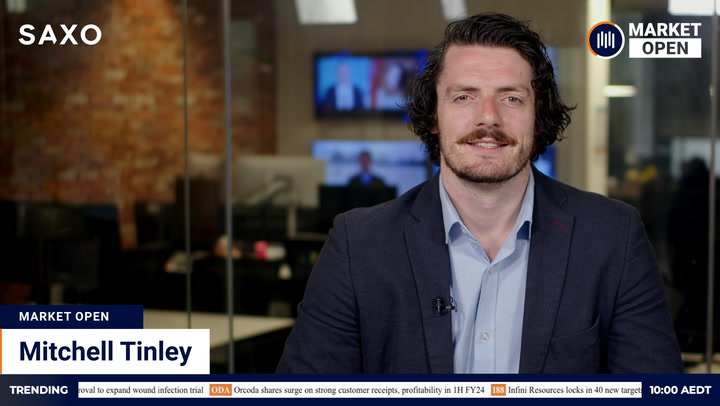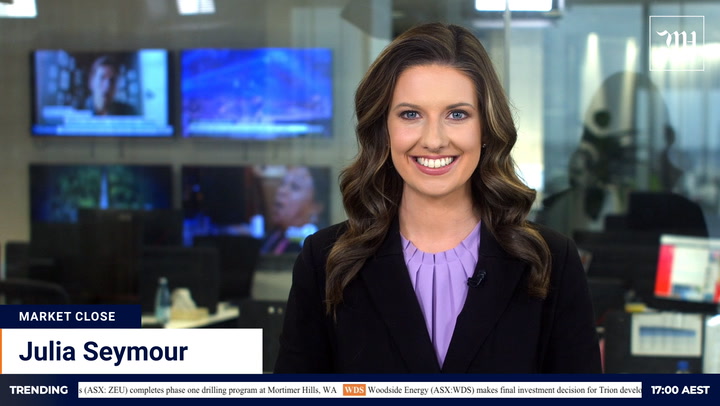The share market faced early pressure after rising energy prices and evidence of economic slowdown weighed on Wall Street.
ASX futures declined 54 points or 0.76 per cent, signalling the lowest open in more than two weeks. The market is underwater for the week after the Reserve Bank raised the cash rate target by an unexpectedly large 50 basis points.
Inflation worries revived overnight as oil hit a three-month high. Gold inched higher. The dollar slipped back below 72 US cents.
Wall Street
US stocks succumbed to a steady drip of weak economic signals and negative moves on bond and energy markets. Treasury yields climbed back above 3 per cent. Brent crude cracked US$123 a barrel.
The S&P 500 dropped 45 points or 1.08 per cent. The Dow Jones Industrial Average eased 269 points or 0.81 per cent. The Nasdaq Composite lost 89 points or 0.73 per cent.
Oil rallied to its highest since early March as US data showed demand had yet to be seriously affected by soaring prices at the pump. US crude inventories fell by two million barrels last week, according to the Energy Information Administration. Gasoline stocks declined by 800,000 barrels.
Brent crude settled US$3.01 or 2.5 per cent higher at US$123.58 a barrel. The US benchmark climbed 2.3 per cent to US$122.11.
“People looking for the peak inflation narrative keep getting hit in the face every day as energy goes up,” Thomas Hayes, managing member at Great Hill Capital, said.
Companies whose earnings are most affected by higher fuel prices led the selling. The Dow Jones Transportation Average slumped 3.81 per cent.
Bond yields rose as economic data pointed to an increasing risk of recession. Demand for mortgages fell 6.5 per cent last week to a 22-year low.
A decline in a Federal Reserve growth gauge suggested the economy could contract for a second straight quarter. (US GDP shrank 1.5 per cent over the first three months of the year.) Forecasts for personal consumption expenditure shrank.
“Forward-looking recession probabilities are likely to look far more sinister later this year as financial conditions tighten,” Deutsche Bank’s chief US economist Matthew Luzzetti wrote.
Chip stocks fell after Intel warned of falling demand. The chip maker’s shares slumped 5.28 per cent.
A profit warning pulled Credit Suisse down 1.01 per cent. The investment house expects to post a loss for this quarter as central banks tighten monetary policy and clients deleverage.
Energy and Chinese tech stocks were among the night’s best performers. US-listed Chinese stocks have rebounded on reports Chinese authorities were winding down an investigation that had depressed share prices.
Australian outlook
A challenging week for Australian investors looks set for another dour session after Wall Street baulked at higher energy prices and hints of looming recession. The S&P/ASX 200 has fallen for two out of three sessions this week and looks set to open this morning near a three-week low.
A tentative rebound yesterday was undermined by pressure on lenders following Tuesday’s rate rise. The overnight action in the US offers no comfort. US financials fell 1.7 per cent.
Energy-sensitive US companies felt the heat from rising prices. Airlines, factories and other major energy consumers here face similar pressures.
US materials dropped 2.1 per cent. BHP and Rio Tinto fell in overseas trade (more below).
Bond proxies were pressured by the rise in treasury yields. Real estate sank 2.43 per cent, utilities 1.98 per cent and consumer staples 1.22 per cent.
Energy was the only US sector to advance, gaining a skinny 0.15 per cent.
A retreat to the perceived security of the US dollar pushed the Aussie down 0.4 per cent to 71.92 US cents.
Commodities
Gold rose for a second session, overcoming pressure from a rising dollar and gains in bond yields. Metal for August delivery settled US$4.40 or 0.2 per cent ahead at US$1,856.50 an ounce. The NYSE Arca Gold Bugs Index failed to follow metal prices, easing 0.53 per cent.
“Yellow metal traders at mid-week are seeing the bullish elements of higher crude oil prices and a still-wobbly U.S. stock market, but also the bearish aspects of rising bond yields and a recent rebound in the U.S. dollar index,” Jim Wyckoff, senior analyst at Kitco, said.
Demand optimism as China eases Covid restrictions kept most industrial metals on the upswing. Benchmark copper on the London Metal Exchange rose 0.4 per cent to US$9,736.30 a tonne. Aluminium gained 1.6 per cent, lead 0.7 per cent, zinc 1.1 per cent and tin 2.7 per cent. Nickel retreated 2.1 per cent.
The recent rally in iron ore stalled amid reports of hesitancy among steel mills following strong recent gains. The spot price for ore landed in China inched up seven US cents or less than 0.1 per cent to US$145.88 a tonne.
Prices on China’s Dalian Commodity Exchange eased 0.5 per cent to US$138.85. Dalian prices hit a ten-month high on Monday.
“The short-term drive is upward but the valuation is on the high side, and the risk of volatility will increase in June-July,” Zhongzhou Futures analysts wrote.
BHP‘s US-traded depositary receipts fell 2.34 per cent. Earlier, the Big Australian’s UK listing eased 0.18 per cent. Rio Tinto shed 2.44 per cent in the US and 0.43 per cent in the UK.





